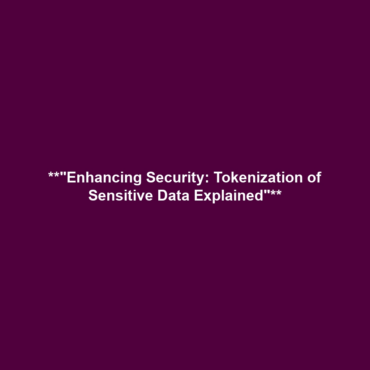Tokenization: Replacing Sensitive Data with a Token for Improved Security
Introduction
Tokenization is an innovative security measure that transforms sensitive data, such as credit card numbers, into unique identifiers known as tokens. This process enhances data security within the broader context of cryptography by minimizing the risk of data breaches. By replacing sensitive information with tokens, organizations can maintain secure transactions while protecting consumer privacy. The importance of tokenization in an age of increasing cyber threats cannot be overstated. It represents a significant shift towards more robust and effective data protection strategies, with its implications resonating throughout the entire domain of cryptography.
Key Concepts
What is Tokenization?
Tokenization refers to the process of substituting a sensitive data element with a non-sensitive equivalent, known as a token. The token has no extrinsic value and cannot be reversed to its original form without specific security keys.
Principles of Tokenization in Cryptography
- Data Minimization: Tokenization limits the amount of sensitive data stored, reducing risk.
- Reversibility: Only authorized parties can revert tokens to their original sensitive data.
- Isolation: Tokenized data is segregated from operational systems, enhancing security.
Applications and Real-World Uses
Tokenization has a host of real-world applications that highlight its importance in security and cryptography:
- E-commerce: Online retailers widely implement tokenization to secure credit card transactions.
- Payment Processing: Payment gateways employ tokenization to safeguard sensitive payment information.
- Healthcare: Tokenization protects patient data, maintaining privacy compliance under HIPAA regulations.
The applications of tokenization in cryptography showcase its critical role in ensuring the confidentiality and integrity of sensitive data.
Current Challenges
Despite its advantages, several challenges and limitations persist in the study and application of tokenization:
- Integration Issues: Incorporating tokenization into existing systems can be complex.
- Token Management: Securely managing and storing tokens presents its own risks.
- Regulatory Compliance: Adhering to various regional regulations can complicate implementation.
Future Research and Innovations
The future of tokenization in cryptography is bright, with various innovations on the horizon:
- Advanced Cryptographic Solutions: Development of next-gen encryption techniques to enhance token security.
- Integration with Blockchain: Leveraging blockchain technology for decentralized token management.
- AI-Driven Solutions: Utilizing artificial intelligence to improve the efficiency of tokenization processes.
Conclusion
Tokenization represents a transformative approach to enhancing security by effectively replacing sensitive data with secure tokens. Its applications and ongoing developments in the realm of cryptography underscore its importance in safeguarding personal information. As cyber threats evolve, investing in tokenization technology will be crucial for organizations aiming to protect their data integrity.
For further exploration, consider reading about data encryption techniques or cybersecurity best practices.
